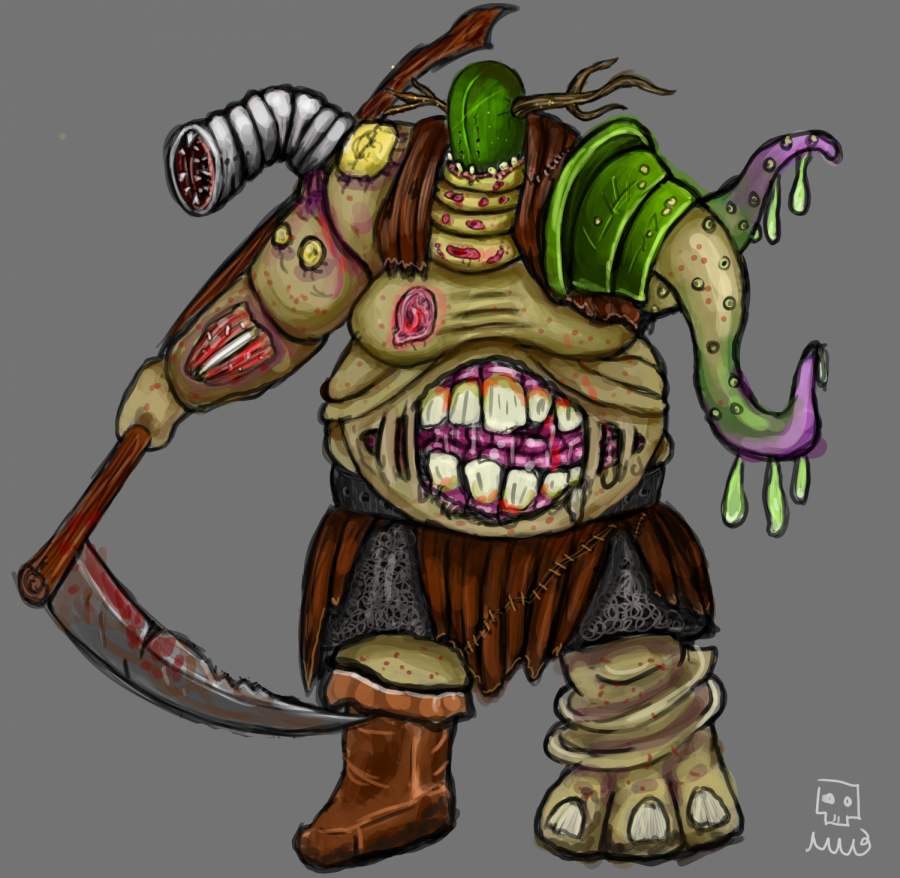The 2019 Measles Outbreak
MEASLES THREAT: The Measles outbreak depicted in the illustration displays how it is a large threat to the unvaccinated.
March 13, 2019
Measles is a highly contagious disease and there are currently multiple outbreaks throughout the United States, it spreads through the air from a person who has the disease, but the symptoms do not appear until two weeks after the original exposure. Fever, rash, runny nose, sore throat, dry cough, and inflamed eyes are all common symptoms of measles. According to the CDC, “From 2001-2013, 28% of children younger than five years old who had measles had to be treated in the hospital. For some children, measles can lead to pneumonia, lifelong brain damage, deafness and death.” The young are the most susceptible to this disease.
Washington is currently undergoing a measles outbreak. The outbreak in Washington state is one of the larger outbreaks in the United States. According to the Department of Health, the outbreak has affected both Clark and King counties. There are 70 cases of measles in Clark County and one case in King County, or a total of 71 cases in Washington state. The initial outbreak of 31 cases caused Washington governor Jay Inslee to declare a state of emergency on January 22. By the month of March, the amount of cases has more than doubled. According to CNN, the outbreak in the Pacific Northwest was caused by “an infected child from Ukraine that came to Clark County over the holidays.” Normally that would not be too big of an issue; however, “Clark County schools have some of the lowest vaccinations rates in this country. Before entering kindergarten, kids are supposed to have had two doses of the measles, mumps, and rubella. But in Clark County last year, fewer than 85% of kindergartners were up to date, well below the roughly 95% vaccination rate required for “herd immunity” to take effect and protect those who are too young or medically unable to be vaccinated.” The main issue is not the infected child from Ukraine coming to the United States; it is the staggeringly low immunization rate in Clark County which led to measles spreading.
In King County, it appears that some students are not too concerned about the current outbreak in Washington. Junior Aedan Henry says, “I am not really concerned. They are going to stop it eventually. I am vaccinated.” On the other hand, senior Lucian Cosson says, “I am a little bit concerned. I hope the outbreak stops growing soon. I am not really worried for myself since I am vaccinated.” It makes sense that some students in King County are not that concerned about the outbreak, since there is barely any cases. The recorded cases are a very small number compared to the population of the whole county. While 71 people may not seem like much compared to Washington’s general population, these cases have affected a surprising amount of people in Clark County. According to the Seattle Times, “More than 800 students considered exposed to the highly contagious disease in Clark County have been ordered to stay away from classrooms for up to three weeks. Since early January, field trips, after-school activities such as family nights, even an assembly honoring Martin Luther King Jr. have been canceled or postponed. Some students are doing homework off prepared handouts; others are using their school-issued laptops to keep up.” The 800 plus students being affected by this outbreak is no joke. The effects of the local outbreak are more widespread than initially thought to be by many.
The easiest way to avoid getting measles is through a MMR vaccine. This protects the patient from multiple diseases including measles, mumps, and rubella. The MMR vaccine is one of the best and only ways to prevent getting measles. According to the Department of Health, “The MMR vaccine protects against all strains of measles including the D8 strain found in the Washington State outbreak.” With the MMR vaccine existing, there should not be any more cases of measles in the United States. However, that does not seem to be the case. According to the CDC, In 2019 there have been “six outbreaks. Two in New York State, New York City, Washington, Texas, and Illinois.” This indicates that some people are not being vaccinated for measles, which can really add up once you consider how contagious it is.
Vaccinating yourself against measles is a quick and easy process. If all people in the United States are vaccinated, the ancient disease of measles will quickly become extinct. However, some people voluntarily choose to not vaccinate themselves and their children. This group of people are known as the “Anti-Vaxxers”, they do not believe in the use of vaccines, and States are blaming these people for the recent measles outbreaks that have occured. Sophomore Liv Ollestad says, “The only argument for not vaccinating is it is not natural so people should not do it. If you vaccinate them you are injecting them with the virus, but that is how vaccines work.” There are many different reasons that influence people to not vaccinate themselves and their children. For example, vaccines can go against some cultural or religious beliefs whereas others are scared about the vaccines having harmful side effects. Freshman Maxwell Morrey says, “ [Anti-Vaxxers] believe that the vaccines can be harmful and they can give your child diseases.” According to CNN, Eduard Rusu “said he had an adverse vaccine reaction five years ago and has not vaccinated his own children, who are six and two. ‘If you read the fine print, I’m sure somewhere there, it says there is a possible fatal outcome there. Some possible fatal consequences. And that gets you a little worried.’” Rusu’s bad reaction to a vaccine is a rare case. It actually is more dangerous not to vaccinate your kids since they are the most vulnerable to diseases like measles, which can be fatal in young children if they are not vaccinated, contradicting Rusu’s fear of a fatal reaction from a vaccine. The benefits of the MMR vaccine negate the small risk of receiving the vaccine. Some Anti-Vaxxers even go as far to believe that vaccines can cause autism, although this theory has not been proven with actual evidence.



